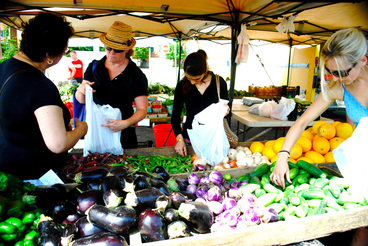 They say that first you eat with your eyes. Food can look wonderful but in the wrong hands, it could be a less than pleasant experience. Even then, in the hands of a professional, lackluster ingredients can't perform the same way that it's gourmet counterparts could. Still, this is only referring to the physical qualities of food, nutritional (and monetary) value is a whole other battle to be waged in the grocery. Yes, ladies and gentlemen. Shopping is a crucial part of food prep, and not just because you need ingredients to cook. Food should not only taste good, it also needs to be good for you. Smart consumerism is often taken to mean getting the most bang for your buck, but as Kerrie Martin, a certified Holistic Health Coach, and Penny Capps, a certified Massage Therapist and Personal Trainer, want us all to know that when it comes to your health quality is far more important than quantity. As a part of their discussion series "Making Food Choices Count", the duo held a casual field trip at our very own market. The group was eager to explore, shop and learn more about the things offered by farmer's markets, as well as the buzzwords attached to them. So, armed with reusable grocery bags and a ton of questions, they got hands-on with their food. June is National Dairy Month! Started in 1937 to counterbalance a surplus of milk, the holiday came to be observed by visiting local dairy farms, sharing favorite recipes and, of course, consuming lots of dairy products! Whether you prefer it as yogurt, ice cream or a classic cheese you're guaranteed to be doing wonders for your own health. And if you're trying to get ready for bikini season, milk contains nine essential nutrients which may help to better manage your weight and is also an excellent source of protein to follow a good workout. If now you're picturing a delicious grilled cheese or a tart berry parfait, keep reading. In its basest description, the West End Farmer's Market is just that- a market, a commercial center. However, we know that produce and money are not the only things exchanged here. Our vendors are worlds in themselves; travelers, backyard farmers, musicians, artists, parents, all of whom have more to offer than baked goods and handmade jewelry. So, it’s time we were all properly introduced. This Saturday at the Unitarian Universalist Church in Arlington the documentary "Farmadeddon" will be shown at 11:30AM. Afterwards there will be a panel discussion about the issues raised in the movie about the troubles small farms are experiencing. Your $15.00 donation will be given to FarmFoodFreedom.org to lobby the FDA on behalf of consumers
For those of you who are die-hard local-food foodies some of the information presented in the documentary might be old news. For others the idea that the USDA has been over-zealous in harassing small farms might be a rather nasty surprise. As Andrew O'Hehir of Salon.com states in his July 8 blog: "Activists, farmers and foodies make the case (in the documentary) for locally grown and minimally processed food, and we hear a lot of anecdotes about governmental overreach, while the bureaucrats either damn themselves by keeping their mouths shut or damn themselves by talking and saying nothing. A Vermont family has its entire herd of imported sheep destroyed, thanks to a completely imaginary outbreak of mad-cow disease (which is not known to occur in sheep in the first place, and definitely didn't occur in theirs). Armed agents invade an upstate New York farm to seize a cooler full of raspberry yogurt. An undercover unit breaks up an interstate trafficking ring -- one devoted to bringing USDA-certified raw milk from South Carolina across the line into Georgia." Why the sudden rush to armed intervention to prevent raw milk from being drunk by consumers? Bureaucracy gone wild?, Stupidity? Pressure on the USDA by Agribusiness? We may never know for absolutely certain. In my opinion, at the very least, the differences between highly processed food factory farms run by corporate agribusiness and local farmers has caused a crisis in identification by the powers that be such as the USDA, and State and Local Health Departments. Here in Virginia, where they support farmers markets, the bureaucracy has difficulty sorting through the differences between agribusiness products and small farm products. They tend to utilize the same rules for both, when in fact regulations that recognize the difference between Agribusiness Products and Small or Sustainable Farm Products has become essential. This documentary is about the moment in time when this concept is still being articulated and lobbied for. As in all moments of change - problems are occurring. But it is possible for people to sway the laws in their favor, lobby their congresspeople, write letters, buy locally grown foods. If you like your free-range eggs, hormone free chickens, and even raw milk - go see the documentary, and donate your money towards the work of re-describing what healthy food is, where it comes, how it is stored, and take a look at a moment in time, just before everything either facist-like stubbornly stays the same or serendipitously changes drastically. For more information on these issues go to: http://grassfedonthehill.com/about-grassfed-on-the-hill Concerned Mom writes:
The grocery store is currently selling strawberries from California for $1/lb. The local berries cost $3.95. For people on a budget, like the pensioner I met, said she would love to buy the local berries, but finds it hard to justify the cost when she could get 4 times as many strawberries if she buys the ones from California. I have that dilemma too, but sometimes I can pick my own for $2/quart. If there was a way for people to obtain local produce for less then I think more people would be buy it. Response: This question raises a dilemma that has no obvious or quick answer. In season, produce at the farmers market is usually similarly priced to what's in the grocery store. This is mostly true of onions, potatoes, eggplants and greens. Fruit tends to be more expensive because farmers are picking them by hand. At the West End Farmers Market, as produce come into and goes out of season (and are thus more rare), they become more expensive - that's the law of supply and demand. Agribusiness supplies cheap out-of-season fruits to grocery stores by picking them where they are in season, like California, and shipping them long distances. Produce picked in California has to be picked before it is ripe, irradiated to keep the ripening process at bay, irradiated again at the endpoint to start the ripening process again, and so on. The result is a fruit or veggie that looks shiny and beautiful, but perhaps has lost its taste, and has certainly lost its nutrient value. Agribusinesses receive massive subsidies from the government to ensure relatively low prices. For example, the corn industry received 250 billion in subsidies from the federal government.* Small farms cannot compete at that level, nor do they receive those kinds of subsidies. And they must charge according to what will support their farms. So how can you eat local and not overspend your budget? Buy what's in season, at the height of the season when you can purchase at lower or similar prices to the grocery store. Canning or freezing produce at the height of the season ensures that you will have healthy, tasty, nutritious food all year long at reasonable prices. Freezing is remarkably easy. You can just place berries in small resealable bags, take the air out, seal them and put them in the freezer. Don't wash before putting them in bags because the water will freeze them in weird ways. Wash after you take them out and thaw them. And in January, just when you are going crazy for some summer fruit, you'll have some on hand. Sometimes a person just needs a strawberry, even if it is January, and you don't have any frozen ones on hand. This is the time to practice indulgence-awareness. Maybe only purchase strawberries every now and then, not every week. Life should be fun - neither extravagantly hedonistic or guiltily abstemious. The challenge is striking that balance. *See NPR, Newsweek and EWG for confirmation Want to know what it's like on a farm? There are a few farms in Virginia that are less than 50 miles from from the West End Farmers Market where you can stay overnight.
It has been more than a week since we heard anything further on the very dangerous e-coli outbreak in Europe. This e-coli was a vicious strain that resisted normal antibiotics and killed, at last count, 22 people. European officials were frantically searching for the source of the bacterial infection, pointing fingers first at cucumbers from Spain, then sprouts from a farm in Germany. Neither of those turned out to be true. Interestingly, the story faded quickly, although paranoia about food consumption seems to be still in progress. The BBC reported six days ago that Spanish farmers can't give away their produce, even though noone has been able to prove the E-coli came from Spain.
I have a prediction. European investigators will find that international produce, which is picked early and trucked or flown long distances, will be passing through a common processing plant where they are sprayed clean of dirt, waxed to look good, irradiated to force them to look ripe, and sometimes packaged. The E-Coli will be entering the food system at this site, the processing plant, through a contaminated water system. This processing plant will be located near an animal processing plant, called CAFO (Concentrated Animal Feeding Operations). At these sites, animals are kept in a small space and given antibiotics to stave off the infections that occur from a poor diet, lack of exercise and, most importantly, standing all day, up to their stomachs, in their own poop. The antibiotics come out in the poop, mix with all the other poop and this slurry of poop and its accompanying mix of bacteria, fungi, viruses, etc goes sliding into the nearest stream or pond, or seeps through into the water table, contaminating the water system in the area around the CAFO. Of course bacteria are going to become resistant and are given the opportunity to become resistant since they are swimming around with antibiotics - they learn how to thrive in spite of them. If you listen very closely to what the news reports coming out of Europe you will hear the scientists continuously mention looking at the places where the food was processed. I predict within the month, we will hear that the source of the E-Coli is in the processing, and is due to contaminated water. This is the one of the best arguments for shopping local I can think of! YOU, loyal farmers market people, you don't have to worry about the food you purchase at our market! You see that dirt on the carrots - that is the dirt they grew in. Wash it at home - your tap water does not have E-Coli, does not come from a well near a CAFO! You can rest assured, you will eat well, and safely when you buy at your local farmers market! |
West End Farmers Market
|
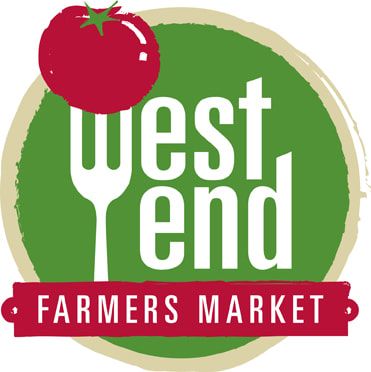
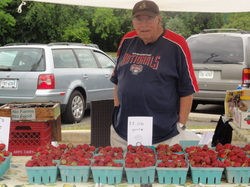
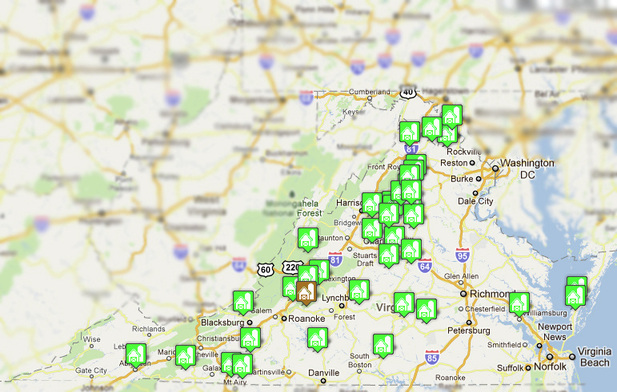
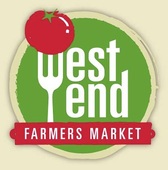
 RSS Feed
RSS Feed
